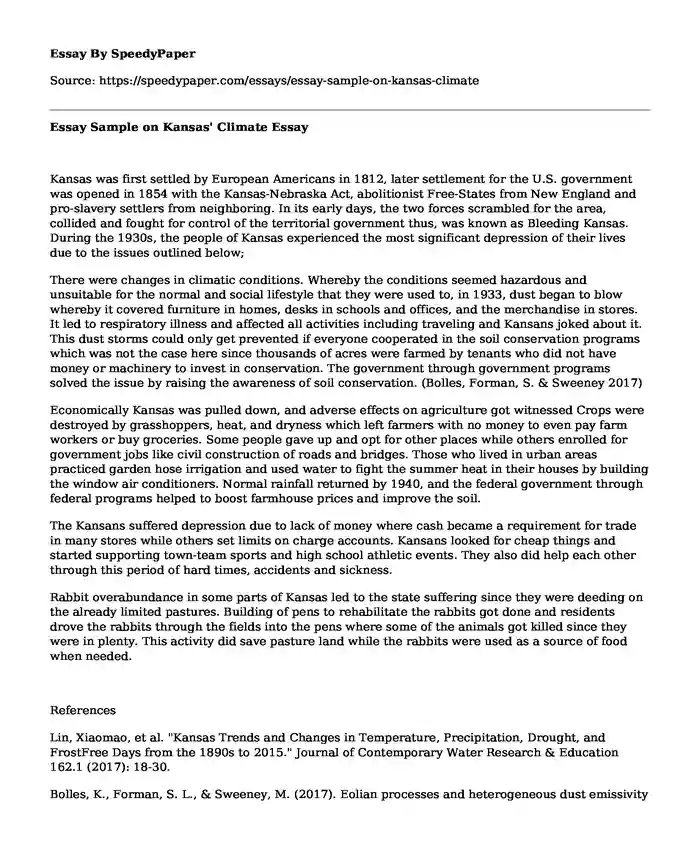Kansas was first settled by European Americans in 1812, later settlement for the U.S. government was opened in 1854 with the Kansas-Nebraska Act, abolitionist Free-States from New England and pro-slavery settlers from neighboring. In its early days, the two forces scrambled for the area, collided and fought for control of the territorial government thus, was known as Bleeding Kansas. During the 1930s, the people of Kansas experienced the most significant depression of their lives due to the issues outlined below;
There were changes in climatic conditions. Whereby the conditions seemed hazardous and unsuitable for the normal and social lifestyle that they were used to, in 1933, dust began to blow whereby it covered furniture in homes, desks in schools and offices, and the merchandise in stores. It led to respiratory illness and affected all activities including traveling and Kansans joked about it. This dust storms could only get prevented if everyone cooperated in the soil conservation programs which was not the case here since thousands of acres were farmed by tenants who did not have money or machinery to invest in conservation. The government through government programs solved the issue by raising the awareness of soil conservation. (Bolles, Forman, S. & Sweeney 2017)
Economically Kansas was pulled down, and adverse effects on agriculture got witnessed Crops were destroyed by grasshoppers, heat, and dryness which left farmers with no money to even pay farm workers or buy groceries. Some people gave up and opt for other places while others enrolled for government jobs like civil construction of roads and bridges. Those who lived in urban areas practiced garden hose irrigation and used water to fight the summer heat in their houses by building the window air conditioners. Normal rainfall returned by 1940, and the federal government through federal programs helped to boost farmhouse prices and improve the soil.
The Kansans suffered depression due to lack of money where cash became a requirement for trade in many stores while others set limits on charge accounts. Kansans looked for cheap things and started supporting town-team sports and high school athletic events. They also did help each other through this period of hard times, accidents and sickness.
Rabbit overabundance in some parts of Kansas led to the state suffering since they were deeding on the already limited pastures. Building of pens to rehabilitate the rabbits got done and residents drove the rabbits through the fields into the pens where some of the animals got killed since they were in plenty. This activity did save pasture land while the rabbits were used as a source of food when needed.
References
Lin, Xiaomao, et al. "Kansas Trends and Changes in Temperature, Precipitation, Drought, and FrostFree Days from the 1890s to 2015." Journal of Contemporary Water Research & Education 162.1 (2017): 18-30.
Bolles, K., Forman, S. L., & Sweeney, M. (2017). Eolian processes and heterogeneous dust emissivity during the 1930s Dust Bowl Drought and implications for projected 21st-century megadroughts. The Holocene, 27(10), 1578-1588.
Cite this page
Essay Sample on Kansas' Climate. (2022, May 09). Retrieved from https://speedypaper.net/essays/essay-sample-on-kansas-climate
Request Removal
If you are the original author of this essay and no longer wish to have it published on the SpeedyPaper website, please click below to request its removal:
- America's Transition into a Super Power - Free Essay in American History
- Free Essay: The Biology of Belief Book Analysis
- Nursing Essay Sample: Middle Range Theories in Nursing Practice
- Free Essay Focused on Stretching and Flexibility
- Essay Sample on Role of Women in Wole Soyinka's "Death and The King's Horseman"
- Free Essay: Manuscript Speech about LeBron James
- Essay Sample on Areas of Strength Within the Leadership Domain
Popular categories





